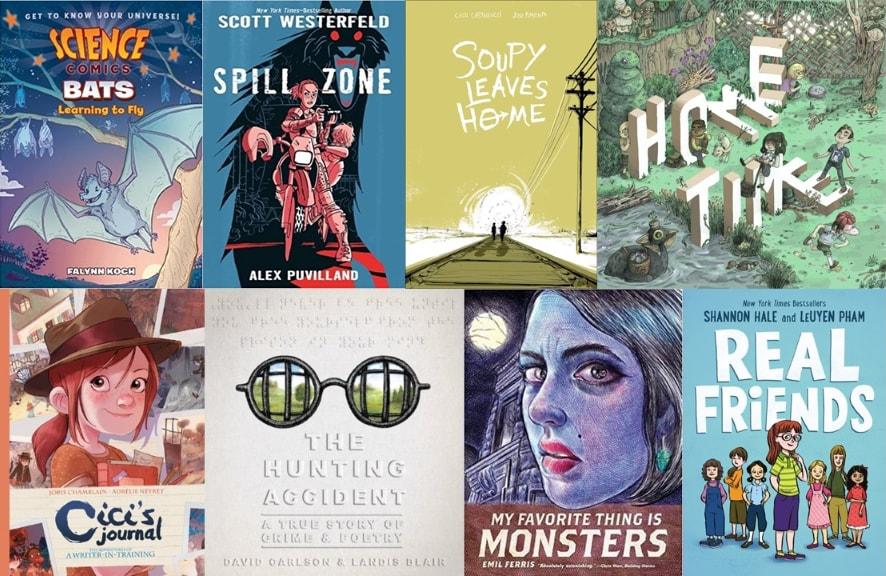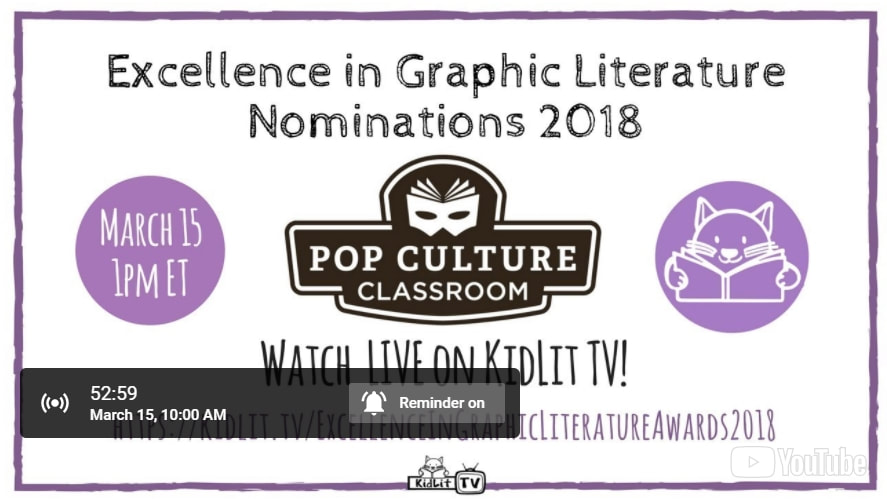|
NEWS! This morning, the organizers of the Excellence in Graphic Literature Awards announced their nominees for the first-ever slate of EGLs, to be awarded at the Denver Comic Con on June 16. The livestream of the announcement, hosted by KidLit TV, can be (re)viewed here. Also, PR Newswire has a press release including the full list of nominees. It's an interesting list, with books I love, books I admire, and books I'd like to get to know. The EGL Awards, as I posted this morning, aim to strengthen the link between comics publishing and the field of children's and Young Adult librarianship. School librarians, public librarians, and K-12 educators are well represented in the judging panels and advisory board, and indeed seem to be the Awards' center of gravity. The awards include eight categories organized by age range, as well as one diversity-themed prize, the Mosaic Award, and an overall Book of the Year prize with contenders drawn from the other categories. The age-based categories are divided into Fiction and Nonfiction for Children (Grade 5 and under), Middle Grades (Grades 6-8), Young Adults (Grades 9-12), and Adults. (You can find out more about the EGL categories at the Pop Culture Classroom, here.) It seems to me that the EGLs have been rolled out in, for comics, unusually coordinated and deliberate fashion. I expressed reservations about the seeming outlook of the Awards when I first learned of them (see the comments thread here), and continue to wonder at the Awards' judging culture and, perhaps, selective filter—all based on my guesswork, I hasten to add. It does seem likely to me that the EGLs will filter out significant parts of comics culture and book-length comics publishing. However, this is also true of other industry awards that seek to cover the whole span of book-length comics, such as the Eisners; all have blind spots, and all speak to the interests of particular communities within the comics world. That said, this first EGL slate strikes me as solid and promising, with an encouraging diversity in aesthetic, genre, and tradition. I also like the range of publishers represented (though First Second Books is clearly the favorite, with five out of the eight nominees for Book of the Year). I confess, I do see a few frank headscratchers among the nominees (what award process is without those, though?). The nonfiction choices for Children and Middle Grades are quite thin, and in general I feel more confident of the YA and Adult categories. Also, the Best of Year finalists make for, um, an odd set: apples and oranges and then some. Further, I'm not sure that all the nominees quite match the high literary aspirations implied by the Awards' name, suggesting that the "L" in EGL may be an awkward fit for some comics, even very good ones (but, um, the politics of respectability is perhaps too big a problem for one award to solve?). Here is the full list of finalists, as reported today: CHILDREN'S BOOKS Fiction
MIDDLE GRADE BOOKS Fiction
YOUNG ADULT BOOKS Fiction
ADULT BOOKS Fiction
MOSAIC AWARD FINALISTS
BOOK OF THE YEAR FINALISTS
Quite a list. I'm excited to see, for example, Liniers, Melanie Gillman, Tillie Walden, Katie Green, Thi Bui, Emil Ferris, Guy Delisle, and the team of Stacey Robinson and John Jennings. I'm also excited to see promising books from creators I don't know. The division of Awards by age range, and the list of publishers represented, perhaps indicate the Awards' intended focus and community more clearly than anything I could say. Let's see what happens. PS. It was a pleasure to see among the EGL jurors and advisors in this morning's video announcement my friends and colleagues Dr. Katie Monnin of the University of North Florida (we judged Eisners together in 2013) and Carr D'Angelo and Susan Avallone of Earth-2 Comics, my LCS!
2 Comments
NEWS! The first-ever set of nominations for the Excellence in Graphic Literature Awards is fixing to go live, in about an hour, thanks to KidLit TV.
The EGL Awards are sponsored and organized by the nonprofit Pop Culture Classroom, and represent an effort to tie a major comics award more directly into the worlds of children's and YA graphic novel librarianship. The Comics Journal's Alex Dueben interviewed two of the people behind the EGL Awards, John Shableski and Illya Kowalchuk, back in January (and I tentatively raised some concerns about the Awards in the comments thread). It'll be interesting to see this first slate of nominees! You can access the livestream of the nominations (10:00 am PCT, today, Thursday, March 15) at KidLit TV, here. |
Archives
April 2022
|



 RSS Feed
RSS Feed
